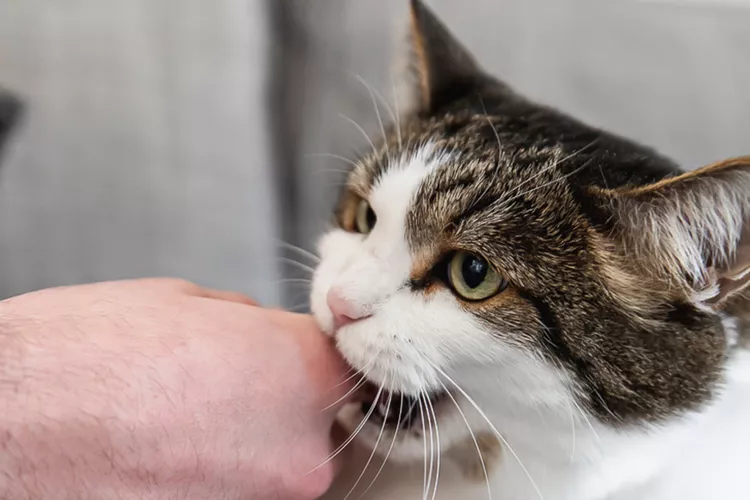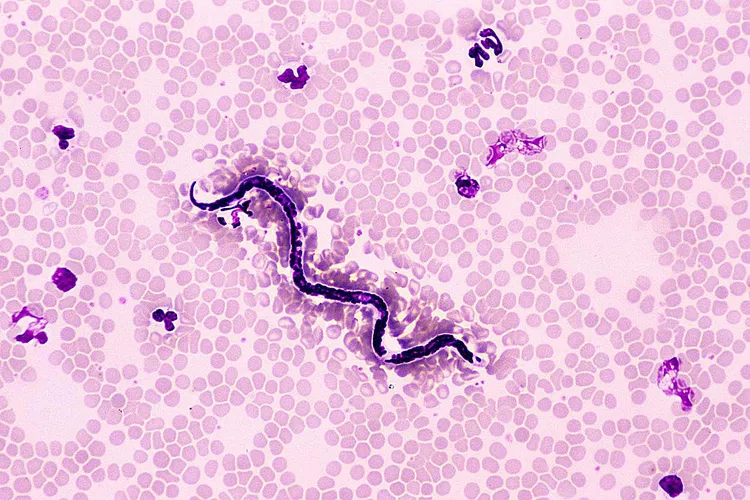
Why do cats bite you? Cats may bite when they're playing, to demand attention, or because they feel stressed out or threatened. Kittens will bite, mouth, and paw at things to explore their world—these are all natural behaviors that can continue into adulthood.
Because some bites can be painful and cause injury, it's important to teach your cat not to bite you or other people. Here's why your cat bites you and how to stop it.
Cats and kittens may bite for different reasons, and it's important to distinguish between them to help curb the biting. Kittens often bite when teething or out of curiosity or playfulness, while adult cats are more likely to bite for other reasons.
Kittens learn manners and appropriate cat play through interaction with other kittens and their mother. But too often, kittens go to new homes before they've learned these important lessons and their owners need to teach them. Even adult cats who were not taught properly may not know that teeth and claws hurt unless you explain it in kitty language the way a mother would.
Cats may bite and scratch when playing with other cats, and they may carry this behavior over to playtime with their humans. Your cat may grab you with their mouth and bite, sometimes painfully. Some cats get caught up in the fun and don't realize they are play-biting too hard. Other times, the cat becomes overly excited and begins to act defensively.
Some cats will seem to enjoy petting up to a point, and then suddenly snap, bite, or scratch, seemingly out of nowhere. Petting aggression is confusing for people, but it often happens because the cat has become overstimulated. Cats may show subtle signs with their body language that they don't want more petting, but we can easily miss these small displays.
Like most animals, cats may bite to defend themselves when they feel threatened or afraid. Some cats bite to stop unwanted actions or behaviors by humans or other animals, especially if this was effective in the past. For example, if they previously bit while having their nails trimmed and then the nail trimming stopped, they may have learned that is an effective tool.
When cats display aggression towards humans, they may actually be upset about something else. Other animals in or outside your home may make cats feel defensive or territorial. If you're the one nearest to the cat, you may get bitten instead. Cats may be frustrated if they can't reach a bird or insect outside and redirect their feelings to you.
Some cats bite as a form of communication or demand for attention. Instead of meowing, they bite. If a cat nips you and then tries to lead you to an activity, such as the food bowl or to play with a toy, this could be the reason.
Believe it or not, some cats like to give "love bites" to people and don't realize it's a little too hard. When cats bite you affectionately, they'll often lick you as well—they're like kitty kisses.
Nearly any medical condition can cause pain or discomfort, and some cats will react by biting, especially if they're touched where it hurts. Before you assume your cat is biting for behavioral reasons, contact your veterinarian to rule out health problems.
If your cat bites you, the best reaction is to stop what you are doing and try to determine why. Watch their body language and assess the environment. If there's something you can change to help your cat relax, such as closing the blinds or removing other pets, do so. Avoid touching your cat again until they calm down.
If your cat bites while playing, make a noise and pull your hand away just as another cat or kitten would to stop the games. Use this as a distraction to stop the behavior, not as a punishment. However, if your cat bites and won't let go, push your hand and arm toward the bite to prompt your cat to release you. Pulling away from the bite can encourage your cat to bite even more.
If the biting continues, visit your veterinarian to discuss the behavior before trying to address it yourself. The vet may discover an underlying health condition to explain your cat's behavior.
While you may not be able to prevent your cat from ever biting again, training techniques can reduce the chances.
With some training, cats can learn how to properly interact without biting you. Your cat can still nibble and play-smack you with a soft paw (claws withheld) and enjoy an appropriate game without drawing blood. It's important to start training as soon as you get your kitten or cat.
It may help to train replacement behaviors. For example, if your cat becomes overexcited and attacks your feet when you walk into a room, teach him to sit and reward him for it. Then, when you come into a room, he will want to sit to get a reward. You can clicker train your cat by pairing a reward like food with a click from a clicker.
Reward your cat for good behavior that occurs naturally. When your cat uses a soft mouth and paws while playing, offer praise or a delicious treat.
No one should allow a cat to play with their bare hands, fingers, or toes. All cats should be taught that hands are not toys. If you offer your hands as toys, you're encouraging a risky habit. Additionally, you should treat your clothing as an extension of your skin and make it off-limits, or your cat won't learn the difference between clawing your jeans and nailing your bare legs.
Avoid physical punishment, which only makes cats more likely to fight back and protect themselves or engage in rough play. Punishment may also cause your cat to fear you.
Maintain consistent responses to your cat's behavior and make sure all family members and visitors follow the same rules. If the cat gets mixed messages, it will be harder for you to enact your training.
When your cat tries to bite you, offer an appropriate interactive cat toy as an alternative. Stuffed animals are a hit with many cats. There should be a variety of toys (at least three) available so your cat does not get bored. Toys that dispense treats are a great way to keep their environment enriched and encourage appropriate play behavior by rewarding play with appropriate objects.
If your vet has determined your cat is physically healthy and you have worked on training without success, it's time to get some help. Ask your vet to recommend a credentialed animal behaviorist who can work with you to develop a behavior modification program. You can also search for a behaviorist through the IAABC's directory.
Cat bites are dangerous to you and other pets. They can cause serious infections and should be treated immediately. If a cat bites you, see a doctor as soon as possible. Up to 75% of cat bites introduce harmful bacteria into the body, including Staphylococcus, Streptococcus, and Pasteurella species. Cat scratch fever, which comes from Bartonella henselae bacteria, may also be transmitted via cat bite.
Signs of infection may manifest in a couple of hours and are particularly risky for hands, joints, and tendons. Take immediate action if a cat bites you:
After the doctor's examination, follow her care plan and keep the wound area clean. Watch for any signs of infection, including redness, oozing, swelling, pain, or fever, and if you spot any, see the doctor again right away.

The First 30 Days With Your New Kitten
The first month is full of changes and excitement for a kitten in a new home. Find out what to expect and what you can do for your new feline friend.
How Old Is Your Cat in Human Years?
As a cat ages, there are often behavioral and physical changes too. Find out how to convert cat years to human years and what to expect at each stage.
What to Buy for Your New Cat: A List of Essentials
Before you bring your new cat or kitten home, there are a number of things to collect or buy so your cat will feel welcomed like a family member.
Human Foods That Are Poisonous to Cats
Many human foods are toxic to cats. Avoid feeding cats table scraps. Instead, feed a nutritious cat food created for their specific nutritional needs.
Cat Food Ingredients to Avoid
When checking the nutrition content of cat food, look for ingredients that are not healthy or show it is of poor quality. Avoid these 3 ingredients.
Should You Feed Your Cat a Raw Diet?
Learn the pros and cons of raw diets for cats, and find out how to choose a raw food diet for your own cat.
Can Cats Eat Corn? Here's What A Vet Thinks
Corn is a common ingredient in cat food and can be a safe treat for cats when fed in moderation. Find out more about how to safely feed corn to your cat.
10 Obscure, Little-known Canine Facts in Honor of National Dog Day
With National Dog Day upon us, it's time to celebrate everything about our favorite pets—even the weirder stuff. Here are 10 obscure facts about dogs you probably didn't know.
The Different Types of Pet-Friendly Workplaces
Discover the different types of pet-friendly workplaces and the benefits they offer employees. Learn how to create a pet-friendly workplace and the best practices for pet owners.
Exploring the Different Types of Pet-Friendly Beaches
Are you looking for pet-friendly beaches? Learn about the different types of pet-friendly beaches, their locations, and tips for visiting them with your pet.
Why Is My Dog Lethargic?
Lethargy can be a sign that something is wrong with your dog. Find out what may be causing this lack of energy and what you should do about it.
Medications to Prevent Heartworm Disease for Dogs
Heartworm disease is a serious risk for all dogs exposed to mosquitos. Find out about the products used to prevent Heartworm disease in dogs.
Can My Dog Eat Tomatoes?
You'll want to keep Fido out of your garden since the tomato plant is toxic, but you can safely offer him ripe tomatoes as a nutrient-packed treat.
15 Best American Cat Breeds
Several cat breeds, including the American shorthair and Bengal, have their origins in the United States. Learn more about these American cat breeds.
Why Do Cats Slap Each Other?
Cats can have some quirky behaviors—one of them being slapping each other. Why do they do this and what can you do to stop it?
Skye Terrier: Dog Breed Characteristics & Care
Learn all about the Skye Terrier, an elegant breed known for its friendly and even-tempered personality with classic terrier traits.
Sloughi: Dog Breed Characteristics & Care
Learn all about the Sloughi, an ancient dog breed known for its impressive running ability, slim stature, and affection toward its family.
English Setter: Dog Breed Characteristics & Care
Learn about the English setter, an excellent hunting breed for pointing and retrieving game. It's also a popular and affectionate companion dog.
Why Dogs Bury Bones and Other Objects
If you give a dog a bone, he might bury it. Why is that? Learn about this burying behavior in dogs and what it means for your pet.
Reasons Why Dogs Run Away and How to Stop It
Dogs can escape, especially if they’re bored and not properly contained. Here are some techniques for stopping your dog from running away.